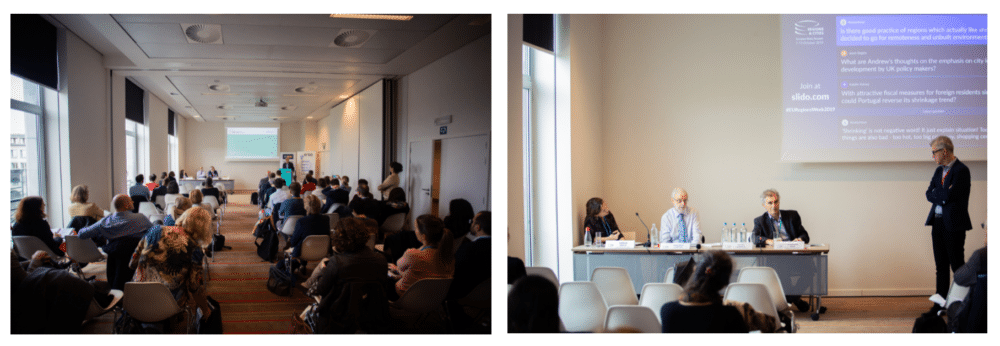Shrinking Rural Regions and Spatial Justice
University session at the EWRC

Summary of the #EURegionsWeek UNIVERSITY SESSION: Shrinking Rural Regions and Spatial Justice is available here.
- Andrew Copus, Economic Geographer, James Hutton Institute, United Kingdom.
- Sabine Weck, Head of Research Group / Deputy Director of Research, ILS – Institut für Landes- und Stadtentwicklungsforschung, Germany.
- Thomas Dax, Deputy director, Bundesanstalt für Agrarwirtschaft und Bergbauernfragen (BAB), Austria.
- Petri Kahila, Research director, University of Eastern Finland, Finland.
The session focused on shrinking rural areas, and how to meet their needs. It was organised jointly by the ESPON ESCAPE project, and Horizon 2020 RELOCAL. ESCAPE explores the concept of demographic shrinkage in its various manifestations across rural Europe. It takes a look at policy approaches, both conventional mitigation (to reverse decline) and adaptation (maximising wellbeing despite decline). RELOCAL focuses on the concept of Spatial Justice, and the potential of place-based local development interventions to tackle spatial injustice. At the heart of this project are 33 case studies.
The workshop was opened by Petri Kahila, introducing the two projects, and stressing the importance of the topic in the context of cohesion and rural development policy after 2020.
Andrew Copus from the James Hutton Institute followed this with a presentation entitled “What do we mean by “shrinking” and how widespread is this across Rural Europe?” It considered the definitions of simple (demographic), and complex (economic and social) shrinkage, and their spatial distribution across Europe. Around two-thirds of the population of Predominantly Rural and Intermediate NUTS 3 Regions has recently been shrinking, is currently shrinking, or is forecast to shrink in future. Different parts of Europe exhibit different kinds of shrinking, and therefore demand different responses.
Thomas Dax (BAB Vienna) presented “Mitigation and adaptation as the basis for intervention logics to address simple and complex shrinking in rural areas”, showing how “levers” vary according to the type of shrinking process. It is important to acknowledge that age structure legacy effects often limit the potential for mitigation, and that adaptation is a more realistic response. This can take a variety of forms, such as “smart shrinking”.
Finally, Sabine Weck, from ILS Dortmund, presented “Spatial justice as experienced by shrinking rural regions”, as illustrated by RELOCAL case studies. Sabine emphasised the importance of local perceptions of the shrinking phenomenon. Place-based or community-based development actions, she argued, can improve living conditions and promoting more balanced and sustainable development in shrinking rural regions. More localised, place-based actions enable better access to substantive needs and a better distribution of resources and opportunities, or promote democratic participation. The presentation considered, in particular, insights on the potentials linked with digitalisation.
AESOP, ERSA and RSA Europe.
Photos from the European Week of Regions and Cities Flickr album at https://www.flickr.com/photos/euregionsweek/albums/72157711257421496
This article was re-posted with permission from the RELOCAL. The original article can be found here.
